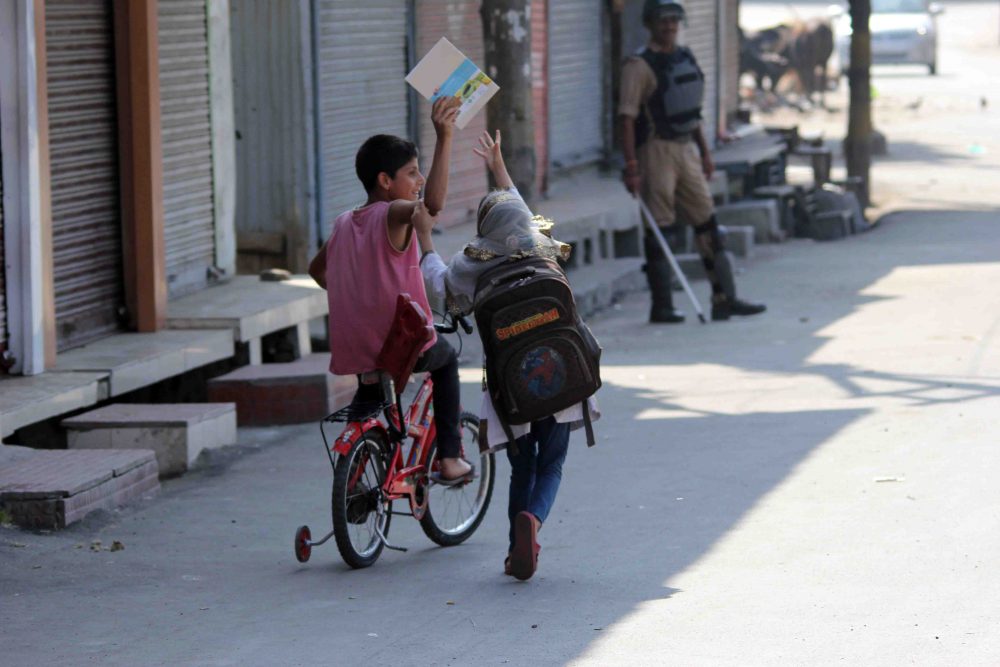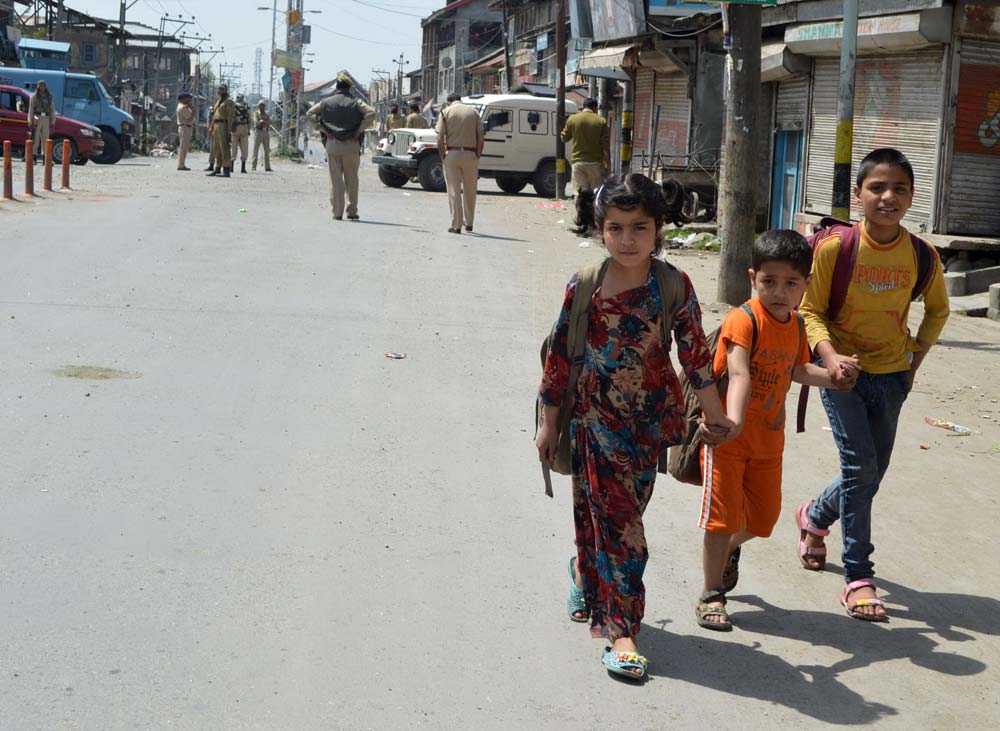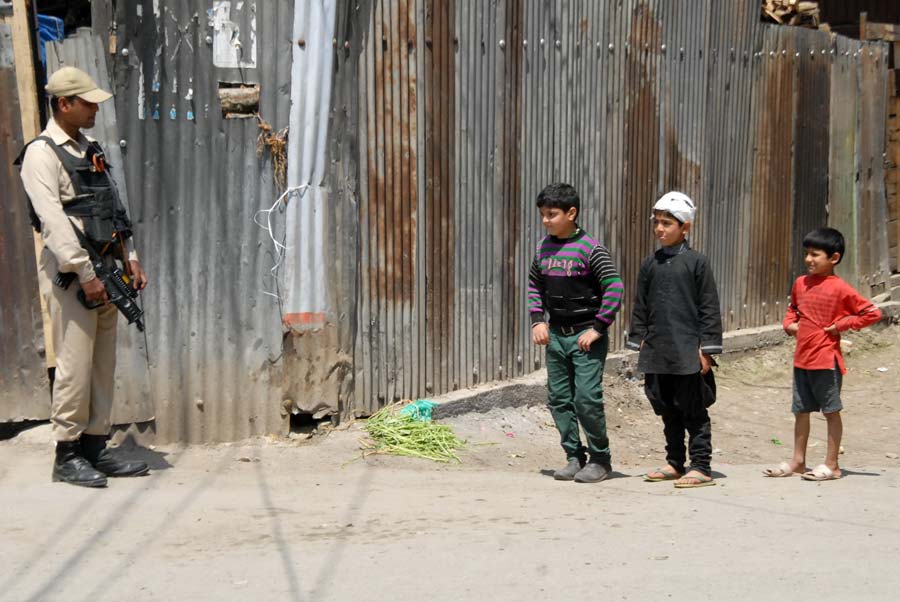With students literally caged for two months now, options to help them study are not around, barring certain symbolic community efforts in a few areas. Shams Irfan reports about the impact the situation is having on the new generation

Since July 9, Ishan, a class 7 student of a reputed missionary school in Srinagar, starts his day by going though local English dailies, something he had never done before.
His interest in news and Kashmir’s troubled history has grown over last two months. “He asks questions regarding India and Kashmir almost every day,” said his father. “He asks why we are being killed and why we are not allowed to live normally.”
Ishan’s father has answer but doesn’t want his young son’s mind to get clogged with politics!
But Ishan, who used to spend his winter holidays shuttling between Mumbai and Delhi with his businessman father, is afraid to travel to “India” because of how it treats Kashmiri kids. “I cannot stop him from drawing conclusions on his own, he is witness to everything that is happening around him,” said his father.
Ishan’s father, a businessman who deals in Kashmiri handicrafts, tries hard to keep his son occupied during curfew, fearing he might join the protestors. “Sometimes he asks such uncomfortable questions that I am at loss,” said his father. “The other day he asked why I am not protesting for Azaadi? Isn’t it everybody’s duty to fight for it?”
Ishan, who only a few months back used to spent his free time in front of a laptop playing all sorts of first person shooter games, now spends time surfing internet, looking at videos of protests and pro-freedom rallies.
“I feel suffocated sitting in this room surrounded by materialistic things while kids of my age are beaten, blinded and killed,” said Ishan in a tone that defies his age.
The other day, Ishan refused to eat dinner telling his mother that it is insensitive on her part to cook mutton when people are fighting on the streets on an empty stomach.
That night he took leftover bread and half-a-glass of milk and retired to his room. “He was never a sensitive kind of kid. Rather, he was a happy-go-lucky chap who was into gadgets and games,” said his mother. “Now he keeps tab of every single happening. He even remembers each slain youth’s name,” said his father. “How can I stop him? It’s like stopping the wind from entering the house.”

Same thought baffles photojournalist Bhat, whose seven-year -old son began asking “uncomfortable” questions too, after the killing of militant Burhan Wani.
“Whenever pro-freedom songs are played in our mosque, he asks me what they mean,” said Bhat. “He asks me who Burhan (Wani) was and why people love him so much. Why everybody is ready to sacrifice their lives for him?”
At first, Bhat tried to divert his son’s young and inquisitive mind, but when he failed, he decided to tell him the truth. “I don’t want him to question his father’s integrity once he grows up and learns things on his own. So I decided to tell him the truth,” said Bhat.
Bhat’s son, who is found of cricket and used to idolize players irrespective of their nationality, now thinks in terms of his identity and present crisis. “Every evening when I return home after covering day’s events he insists to go through every single image I had captured,” said Bhat.
Bhat tried to keep his son away from “gory” images of pellet ridden bodies, emotionally charged up funerals, clashes between protestors and government forces etc. by telling him that he must concentrate on his studies, but it didn’t work.
“He knows how to operate a mobile phone and my laptop,” said Bhat.
The first time Bhat’s son looked at those images on his father’s laptop, he tuned silent for a long time. Then he spoke and asked, “Why they are treating kids like this. Why they fired pellets on this small girls (Insha’s) face? What was her fault? For what crime was she punished? Do they fire at every kid?”
Bhat had no answer expect to shut the laptop forcefully. “But how long can I keep him away from the truth. He will eventually learn it one day,” said Bhat.
Lately, Bhat has arranged a local private school teacher for his son so that he stays occupied till schools resume. “For first few days he missed his school badly. But as situation got worse, he refused to even look at his books,” said Bhat. “One day he startled me when he said, ‘what is the fun of studying when CRFP is killing kids’.”

Equally startled is an academician named Hussain. Hussain’s daughter, who studies in Class 7, at an expensive missionary school in Srinagar, almost jumped from his chair when his daughter asked him if she is a Kashmiri or an Indian?
The next shock came when she asked him about legality of Accession signed by an unpopular Maharaja with Indian Union. “I don’t know from where she gets such thoughts. I was shocked,” said Hussain. “Usually she used to ask about Bollywood actors, new films, famous people, scientists etc. But now she is curious about Burhan (Wani) and Maqbool (Bhat).”
A few months back, Hussain, who was bought up in an ultra-orthodox religious family, recalls his daughter confronting him about gender equality and treatment of women in Islam. “Being a student of a missionary school I expected such questions from her, but not the ones she is asking lately,” said Hussain.
Since Burhan’s killing, Hussain’s daughter now spends less time going through her book and more time reading about Kashmir and its troubled history. “I don’t know what will happen to these kids if they stay at home for long. They are growing up fast in this overwhelming situation around them,” said Hussain.

The first words nineteen-month-old Zuhaa spoke to her parents was Baba and Mama, an endearing term for father and mother. On July 8, almost same time when popular Hizb commander Burhan Wani was killed in a gunfight in south Kashmir, Zuhaa was visiting her maternal home with her parents.
The next 36 hours Zuhaa spent at her maternal grandmother’s house in a south Kashmir town, were filled with pepper gas and tear smoke. The Masjid next to her grandmother’s house played songs eulogising Burhan Wani and other martyrs. Almost every corner of the posh colony would reverberate with the same question: hum kya chahtey? And a loud answer: Azaadi!
As hospitals started to fill with injured and dead, Zuhaa’s father managed to reach his Srinagar home, and next day flew back to New Delhi, where he works as a doctor in a private hospital.
The sound of free life, traffic noise, songs playing on a neighbour’s stereo, cartoon characters and bhajan’s (playing in a nearby Mandir) almost rebooted Zuhaa’s Kashmir memory. But ask Zuhaa hum kya chahtey (what we want) and she quickly raises both her hands in air innocently and would answer: Azaaadeee. “I try not to ask her (Zuhaa) what she needs or wants when in a public place like a shopping mall or a market,” said her mother. “She quickly replies: Azaadeee.”

Hilal Ahmad Dar’s three-year-old son Hadi refused to move out of his house since July 9. Reason, he tells his father: bahar halat bahut kharaab hai (situation is bad tense outside).
But not all are struggling to keep their wards away from the situation in Kashmir; a lucky few have already flown their children outside the valley for seeking education and safety. “Kashmir is a lost case now, I cannot afford to compromise my kids safety and future,” said Nazir, a father of two teenage boys and a girls. After “observing” situation for a few weeks, Nazir flew to winter capital Jammu with his wife and kids. He owns a house there in Sidhrah region. “I got them admitted at a local school on special arrangement basis. Though it cost me a lot but I don’t mind as long as my kids are safe,” he said.
But Nazir’s is not an isolated case, a large number of Kashmiri students, mostly in Class 10 and 12, have joined different private coaching institutes in Jammu, Punjab and Delhi.
Interestingly, a Jammu based private coaching centre, taking advantage of the situation in Kashmir, is sending SMSes to Kashmir based mobile phone users offering special Valley batches for Class 10 and 12 students. The message promises transport and hostel facility as well. “I couldn’t waste my crucial time sitting idle in Kashmir,” said Aftab, a Class 12 student who aspires to become a doctor. “God knows when situation is going to be normal in Kashmir.”
On July 19, ten days after Burhan Wani was killed, and around 30 civilian deaths later, Aftab’s father contacted a private coaching centre in Jammu and flew his son out on the next available flight. “He was getting frustrated here,” said Aftab’s father, a middle rung government employee.

Same thinking forced Nazia, a class 12 student, out of her house into humid environs of Delhi to join a specialised coaching centre. She is staying with her sister and brother-in-law at their rented accommodation in south Delhi. “I waited for around a month to get things back to normal, but they didn’t. So here I am,” said Nazia.
Initially, Nazia felt out of place in a “foreign land” but things improved when two of her classmates joined her at the coaching. “I miss my home but since my friends came I feel better,” said Nazia.
Within no time Nazia and her friends adapted to the weather and the fast life in Delhi. “It is really awesome to be here. I am beginning to like this place. At least I am free here!”















